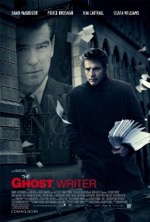The Ghost Writer (PG-13)

Starring: Ewan McGregor
March 2010
“Polanski’s Political Potboiler Stars a Superspy and a Jedi”
Roman Polanski’s The Ghost Writer, though not as shocking as Chinatown or as haunting as The Pianist, is a fine film in its own right, a taut thriller told from the epicenter of a political earthquake. At the center of the epicenter is Adam Lang (Pierce Brosnan), former Prime Minister of Britain, who’s been accused of advancing American policies while he was in office. The revolving door of ghost writers commissioned to massage Lang’s memoir into printable form soon sweeps a young and ambitious scribe, simply referred to as The Ghost (Ewan McGregor), into the web of intrigue and controversy that seems to surround Lang wherever he goes: Lang ping-pongs back and forth between native England and the eastern seaboard of the US.
We enter Lang’s world as an interloper, a voyeuristic onlooker to the drama that unfolds around Lang and those in his orbit. Lang, though understandably and undeniably aristocratic in public, is much more subdued behind closed doors, especially in one-on-one interviews with The Ghost. Past the officious exterior, Lang, when finally able to lay aside the worries of the world, displays a degree of vulnerability that’s a bit unsettling at first. It’s an expertly measured performance by Brosnan, a career actor with an inestimable range (Lang is a light-year from Bond).
McGregor also turns in a fine performance that’s deceptively understated in its fly-on-the-wall subtlety. Even though Lang is sympathetic and central to the plot, the audience identifies more strongly with The Ghost since he’s brought into the political turmoil at the same time that we are. As The Ghost forms his opinions of Lang, we’re right there peeking over his shoulder, sensing, as he does, that something isn’t quite right in Lang’s world.
The Ghost’s expressions of confusion, suspicion and apprehension are mirrored on our faces: in this way, director and writers see to it that character and audience are on equal footing. Or perhaps Polanski is deluding the audience into a state of false confidence. Perhaps The Ghost is one step ahead of us and the only reason we’re clued in at all is because his writer’s eye is leading our gaze to details we would normally miss. Either way, this narrative choice allows for tangible tension to reign supreme throughout the story…and we can be grateful in our consternation since the movie’s intricate web of intrigue ensures a more satisfying viewing experience than a paint-by-numbers puzzler.
Of course, keeping the audience in the dark and methodically parsing out plot details at a pace which produces maximum suspense is a staple of the thriller genre, and few do modern-day political potboilers better than Polanski. Polanski knows how to gradually build anticipation until…bang, some major character revelation or unforeseen event causes a rupture in the story’s stasis. Even though the action never reaches the fevered pitch of a Bourne movie, there are some nail-biting episodes like when The Ghost takes a trip on a ferry boat and discovers that he’s being shadowed.
Though the film’s intensity ebbs and flows (like the undulating ocean waves visible through the window in Lang’s office), an undercurrent of dread is ubiquitous, like apprehensions over the impending storm. The literal storm that’s been brewing since the movie’s early stages finally hits midway through, just as several character arcs are reaching their breaking points. The storm scene, of course, is symbolic of what the characters are experiencing. What would’ve come across as telegraphed by a lesser director is artistically and organically achieved by Polanski, whose expert grasp of storytelling allows for a slow boil approach to these climactic events.
The movie’s East Coast locales serve as an additional, though non-corporeal, member of the cast. The visual splendor Polanski creates, with the assistance of cinematographer Pawel Edelman, is nearly palpable. The overcast, blustery shoreline scenes along Martha’s Vineyard (surprisingly shot in Germany) are visually immersive and are the perfect accompaniment for the movie’s melancholy mood. The scene where McGregor bikes over to Eli Wallach’s house, the expanse of gray and beige creating a haunting yet beautiful tableau all around him, has more atmosphere than many movies have in their entirety.
One of the film’s many highlights is the showdown interview between The Ghost and Paul Emmett (Tom Wilkinson). Few actors can lace pleasantries with napalm like Wilkinson; his character’s thinly veiled disdain for The Ghost boils just beneath the surface of his composed and professional demeanor. Besides containing some tense, hair-raising dialog, the verbal sparring match between Wilkinson and McGregor sets into motion a chain reaction that ultimately leads to The Ghost’s untimely demise: if you’ve seen any of Polanski’s back catalog you can make an educated guess at the nature of the film’s down ending.
Although The Ghost Writer fails to measure up to Polanski’s earlier masterpieces, it’s still a taut yarn with fine performances and a riveting riddle that will keep the audience guessing right up until the bitter end. And let’s face it, a lesser Polanski film is still better than the vast majority of films Hollywood is turning out these days. There’s little intrigue in that statement.
Rating: 3